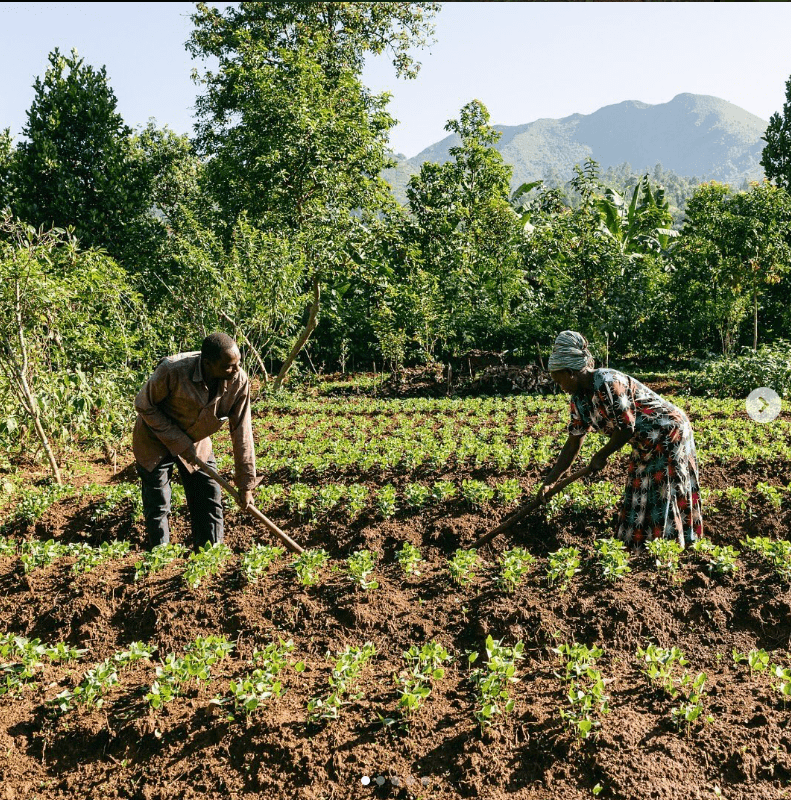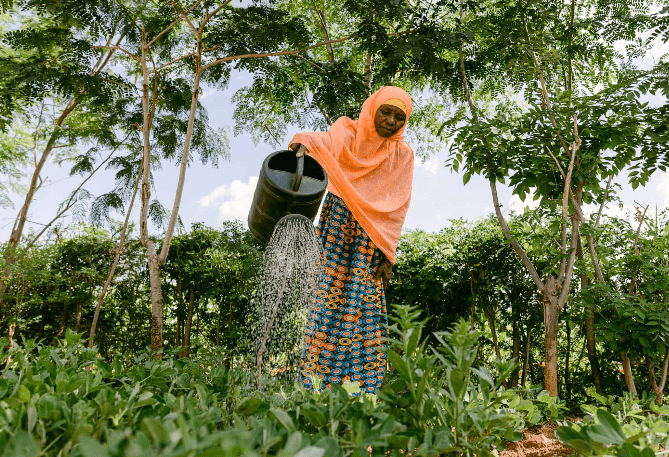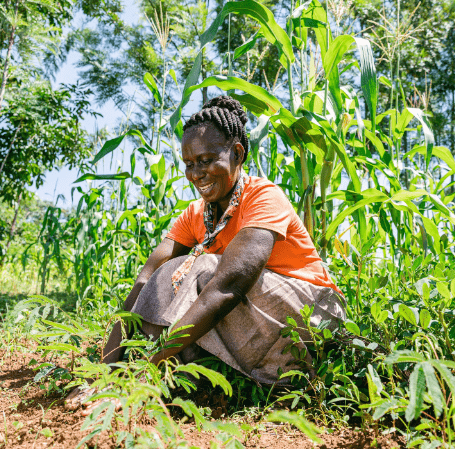
Search

As the global community gathers for the NetHope Global Summit, one of the spotlights is on how digital solutions are driving innovation in climate-resilient agriculture. Climate change is putting immense pressure on smallholder farmers, especially in vulnerable regions, making it crucial to adopt sustainable practices that not only protect the environment but also ensure economic stability. TaroWorks is at the forefront of this conversation, showcasing how mobile technology can bridge the digital divide for non-profits and social enterprises working in agriculture. By integrating offline data collection with carbon credit tracking, organizations like Trees for the Future are using TaroWorks to empower farmers, monitor progress, and contribute to global carbon markets—all while building resilience in communities hit hardest by climate change.
Climate change presents unprecedented challenges to global food systems, particularly affecting smallholder farmers in vulnerable regions. These farmers often bear the brunt of climate-related disruptions, such as erratic rainfall, prolonged droughts, and rising temperatures. To survive and thrive, these communities need more than traditional farming techniques—they require sustainable, climate-resilient practices. One organization leading the charge in this space is Trees for the Future (TREES), which has pioneered a unique approach to agroforestry and sustainable land use through its Forest Garden program.

Trees for the Future is a non-profit organization operating across five countries in sub-Saharan Africa, helping smallholder farmers transform degraded land into thriving, productive ecosystems. By employing the Forest Garden Approach, TREES teaches farmers how to plant trees alongside crops in diversified systems that improve soil health, boost yields, and enhance food security. The initiative has garnered international recognition, including being named a UN World Restoration Flagship and their story has been featured in The Guardian, for its significant strides in ecosystem restoration and its potential to address both poverty and climate change.
A key component of TREES’ success lies in its ability to monitor the progress of these programs, ensuring they are meeting both environmental and economic goals. To do this, TREES integrates mobile technology into its field operations, enabling staff to track the health of trees, monitor soil conditions, and measure farmers’ economic development. This mobile data collection is crucial, allowing the organization to gather real-time information and make informed decisions to continuously refine and improve its efforts.
But TREES isn’t stopping at restoring ecosystems. Through a partnership with climate finance company Aspiration, they are pushing the boundaries of what’s possible by introducing carbon credits into their work. Under this new initiative, TREES is extending its partnerships with smallholder farmers from four-year projects to 25-year contracts, allowing farmers to treat carbon as a crop. The trees planted in Forest Gardens capture carbon dioxide, which can then be sold as carbon credits on global markets.
This innovative approach has profound implications for farmers. By turning carbon sequestration into a source of income, farmers are able to diversify their revenue streams. Carbon credits, alongside improved food security, nutrition, and crop yields, create a multi-layered impact that strengthens both the livelihoods of the farmers and the ecosystems they depend on.

One of the most compelling aspects of TREES’ work is how it integrates technology to enhance transparency, accountability, and scalability. By using mobile platforms to track program performance and tree health, TREES is able to gather the data necessary to verify carbon credits—an essential step in ensuring that carbon markets remain credible and effective in combating climate change. For farmers, this means they can confidently participate in these carbon credit systems, knowing their efforts are accurately tracked and rewarded.
TREES’ approach highlights the transformative potential of mobile technology in scaling climate-resilient agricultural practices. But TREES isn’t alone in recognizing the value of these tools. Across the non-profit sector, digital solutions like TaroWorks are playing an increasingly critical role in supporting the operations of organizations that work on the frontlines of environmental and agricultural challenges.
TaroWorks is an offline-first digital system designed for organizations operating in remote, often digitally underserved areas. Its primary function is to help organizations collect, manage, and analyze data in and from the field—without needing constant internet connectivity, and manage the productivity of frontline teams. This is particularly important for non-profits working in rural areas, where access to reliable technology is often limited, making it difficult for teams to collaborate.
For organizations like TREES, TaroWorks is a game-changer, enabling real-time monitoring of field activities that enhance operational efficiency and support data-driven decision-making. Field workers can gather vital data on tree health, soil conditions, and economic outcomes—even in areas without internet access. With TaroWorks, frontline teams can:
Once connectivity is restored, all data syncs to a centralized system, providing decision-makers with up-to-date, actionable insights exactly when they need them.
What sets TaroWorks apart is its integration with Salesforce CRM, a powerful customer relationship management software. For non-profits, this integration allows them to combine field data with other critical organizational data, such as funding and program performance, into a single system. This enables organizations to create comprehensive reports for stakeholders, donors, and partners, ensuring transparency and accountability.
The ability to collect and analyze data from the field has a direct impact on how non-profits can scale their programs. For TREES, using a digital platform to track tree health and verify carbon credits has allowed them to expand their carbon credit program more efficiently. It ensures that carbon capture is happening as planned, helping farmers and the organization meet the rigorous standards needed to sell carbon credits on the global market.

Beyond helping organizations operate more efficiently, mobile platforms like TaroWorks are also playing a key role in addressing the digital divide faced by smallholder farmers. In many rural communities, access to technology is limited, leaving farmers without the tools they need to access markets, track their progress, or adopt new farming techniques.
TaroWorks is designed to work in these environments, providing a solution that works offline, yet offers powerful capabilities once connectivity is restored. Moreover, TaroWorks UI is simple and easy to use and understand for everyone, making it a mopre inclusive tool for those without digital skills. This has a direct impact on the way non-profits can engage with and support farmers. For example, by using TaroWorks, organizations can collect detailed data from farmers, track the adoption of new farming practices, and provide timely feedback or additional support.
This level of engagement is crucial for building climate resilience. Farmers, especially those in vulnerable regions, need reliable information to make decisions that will improve their crop yields and protect their livelihoods. With digital tools, non-profits can ensure that this information is available and tailored to the needs of each community.
The work being done by TREES offers an inspiring example of how digital solutions and carbon credits can transform climate-resilient agriculture. By combining agroforestry, mobile technology, and climate finance, TREES has created a model that addresses both environmental and economic challenges. Their partnership with Aspiration and the introduction of carbon credits show the potential for scaling sustainable agriculture, offering long-term benefits to farmers and the planet.
Looking forward, the role of digital platforms like TaroWorks in supporting these initiatives is only set to grow. As more organizations adopt mobile technologies, they will be better equipped to scale their operations, improve data accuracy, and strengthen the resilience of the communities they serve. Digital solutions can help bridge the gap between smallholder farmers and the resources they need to succeed in a changing climate.
While climate-resilient agriculture is not a one-size-fits-all solution, the integration of digital tools and carbon credits provides a framework that can be adapted to local contexts. Whether it’s tracking carbon sequestration, monitoring soil health, or providing real-time support to farmers, these innovations are proving essential in the fight against climate change.
At the heart of these efforts are the digital tools that make it all possible. Platforms like TaroWorks provide the infrastructure needed to collect and analyze data from the field, empowering organizations to make informed decisions and scale their impact. As climate change continues to pose challenges for global food systems, the role of digital technology in supporting climate-resilient agriculture will be more critical than ever.
POST TOPICS
Sign up to receive emails with TaroWorks news, industry trends and best practices.
TaroWorks, a Grameen Foundation company.
Site by V+V